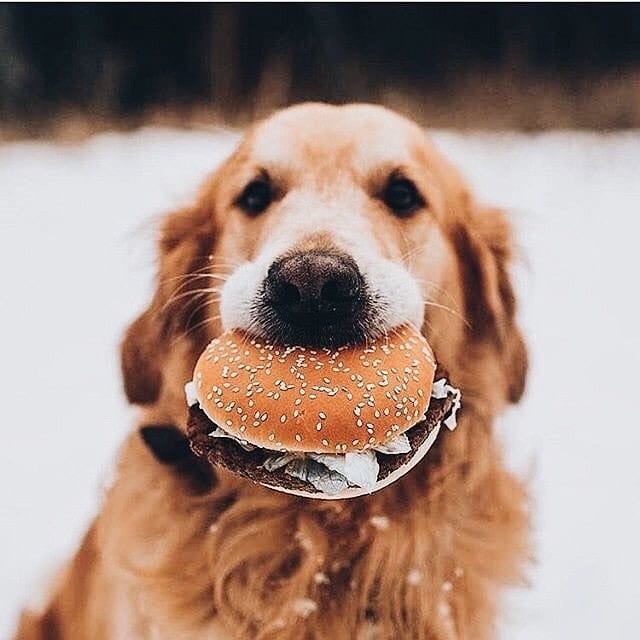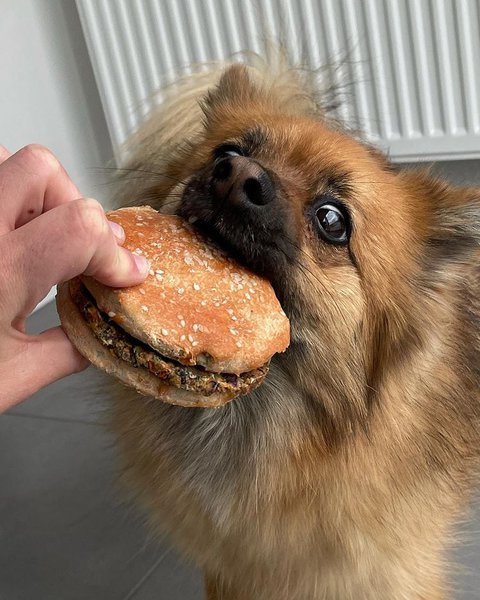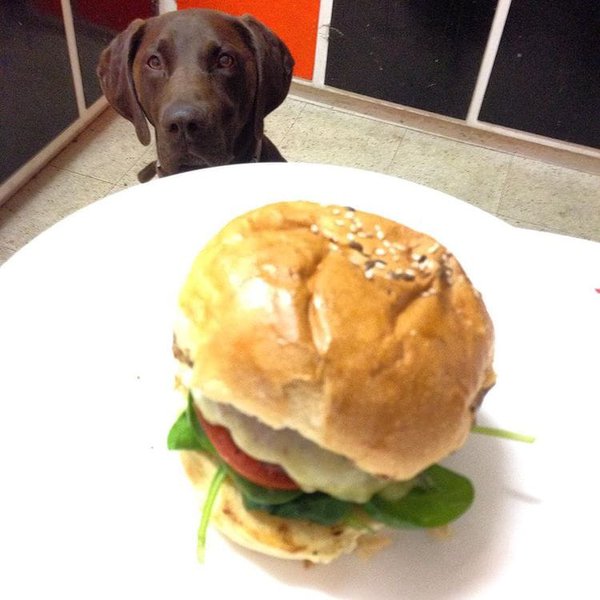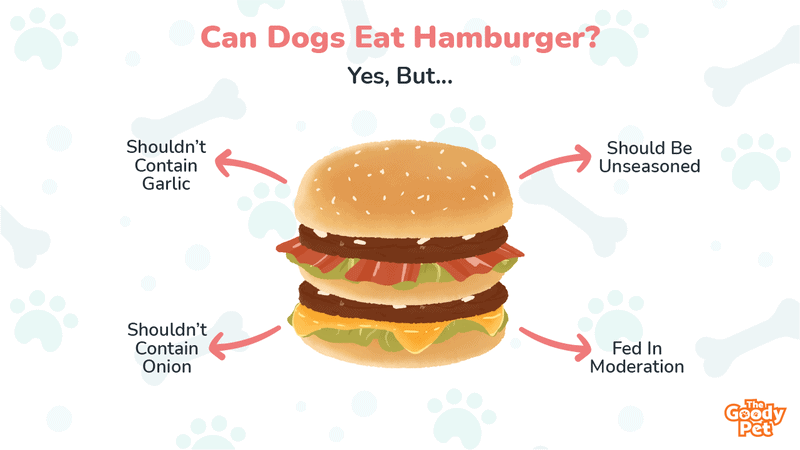What’s not to love about hamburgers? From the juicy, flavorful patty to the fresh toppings, it is arguably the perfect food. If your dog could talk, they would probably give the same review after trying a burger. The question is whether or not it is actually okay to let them have the burger in the first place.
Dogs can eat hamburgers when prepared properly and without ingredients like onions or garlic that are known to be harmful to their health. Furthermore, you have to be careful with the serving portions and toppings because too many hamburgers can be detrimentally harmful to your dog, even with the use of ingredients safe for dogs.
If you are curious about how to safely include your dog in your next barbeque or burger run, you have come to the right place. You will learn all that you need to know about dogs and burgers from how much you can let them eat and what could possibly go wrong if your dog overindulges.
Can Dogs Eat Hamburgers?

Dogs can eat hamburgers safely in most cases. The most important factor to consider when deciding whether or not to allow your dog to enjoy a burger is the list of ingredients used.
This includes ingredients not only in the hamburger meat but also in the bun, toppings, and condiments. Here are a few ingredients that should be avoided if you are considering letting your dog have some of your burgers.
Onions
Onions and their many relatives, including chives, scallions, and shallots, are poisonous to dogs. These staple ingredients are key in the making of hamburgers, whether it is shallots mixed into the burger meat or even caramelized onions used as toppings.
Onions cause a condition referred to as hemolytic anemia in dogs where their red blood cells basically explode. The resulting anemia may manifest as:
- Lethargy
- Confusion
- Pale gums
- Generalized weakness
- Fainting spells in sever cases
Garlic
Garlic also has the same hemolytic effect on red blood cells as onions do. While this effect is worst when fresh garlic is used, the toxicity to your dog can happen even with ingredients like garlic powder or garlic-based condiments.
Preserved Hamburger Meat
Burger meat may seem safe for dogs when taken at face value. After all, it is all meat, and dogs need meat as the biggest part of their diet, right?
It is important to remember that not all burger patties are equal. Those that come pre-seasoned and packaged typically have preservatives and flavor additives that could be dangerous to your dog’s health in the long run.
Tomatoes And Tomato-Based Condiments
Tomatoes are commonly used to top burgers either as fresh slices or in the form of ketchup. Ripe tomatoes are safe for your dog to eat. However, if your dog overeats tomatoes, it may get an upset tummy due to the high acidity levels in tomatoes.
Cheese
What’s a burger without a nice slice of melty cheese, right? Well, if you are planning to feed some to your dog, you may want to leave out what is perhaps one of the best parts of the burger.
This is because most dogs are lactose intolerant and may end up with allergic reactions to the dairy product.
Even if the dog is not lactose intolerant, the cheese could upset their digestion and result in increased gas and/or diarrhea.
How Much Of A Hamburger Can A Dog Eat?

How much of a burger you can feed your dog depends on its size.
If the dog is small or medium-sized, keep it to ¼ to ½ of the burger. It is best to also lose one of the buns and serve it as something similar to an open-faced sandwich.
For large and giant dog breeds, you can feed them up to a full burger with a single, small patty and a single slice of the bun.
What Happens When Dogs Eat Hamburgers?
If the burger is made with safe ingredients, nothing bad should happen to your dog if you let them have some. However, if your dog eats hamburgers in large quantities or too frequently, they are likely to develop health issues.
Here are some long-term and short-term consequences of making a habit of feeding your dog burgers.
Obesity
The average hamburger has about 225 calories. Toppings like cheese, eggs, or mushrooms, as well as most condiments, add to this calorie count significantly.
Hamburgers are, therefore, food that you should completely avoid if you are trying to help your dog lose weight or avoid developing obesity.
Toxic Reactions
If the burger or the toppings used contain harmful ingredients like garlic, onions, chemical preservatives, or even flavor additives, your dog may react negatively.
The effects are more often than not felt first in the digestive system but may also impact other systems and organs like the brain, heart, blood, liver, and kidneys.

Allergic Reactions
Dogs can be allergic to most things used to make burgers. Some of the most common triggers, in this case, include gluten in the burger buns, eggs, and dairy products like cheese or butter. Your dog may also be allergic to the meat.
Food Poisoning
Food poisoning in dogs after eating burgers typically occurs if the meat is undercooked. Hamburger patties that are made rare have been shown to occasionally harbor pathogens like Salmonella.
If your dog gets food poisoning from a burger, you may notice signs and symptoms, including vomiting and watery diarrhea that may eventually turn bloody. If you suspect your dog is having such a reaction, you mustseek urgent veterinarian care to ensure their survival and comfort.
How Do You Make Hamburgers For Dogs?
The best way to ensure that your dog gets to enjoy a burger safely is to make it yourself from scratch. This includes making the patty yourself so you can be sure exactly what is going into your dog’s body.
Here are a few more pointers to help you make the perfect hamburger for your furry best buddy to enjoy.
Unseasoned
This may seem cruel, but we can assure you that your dog will not notice or mind. Avoiding seasonings like hot spices, garlic powder, and salt reduces the risk of your dog developing digestive issues as well as other side effects of toxic ingredients like garlic.
Lean Burger Meat
Making the perfect burger patty for your dog starts with choosing the right kind of minced meat. Ensure that your meat is at least in a ratio of 80% lean meat to 20% fat. This is much healthier for the dog in terms of caloric value and protein content.
If possible, try and get a mix with more of the lean meat and less of the fat. Unfortunately, this is not a common enough request, and you may have a hard time finding such a blend.

Well-Done
A hamburger is not a steak, and there is, therefore, no other way to do it right other than having it well done. This is very important if you are preparing a burger for your dog, as a well-done burger is one where any potential pathogens have been killed off.
This will significantly reduce the chances of your dog developing food poisoning.
No Condiments
While assembling the burger for your pooch, it is best to skip the condiments altogether.
Common condiments like ketchup, mayonnaise, and mustard usually have ingredients and artificial additives that may be toxic to your dog.
Skip The Toppings
Finally, skip toppings like onions and tomatoes, as they will increase the chances of your dog having an adverse reaction to the burger.
However, you can add a slice of lettuce for the crunch, some fiber, and as a fresh addition to the flavor profile. Your dog will definitely enjoy it!





